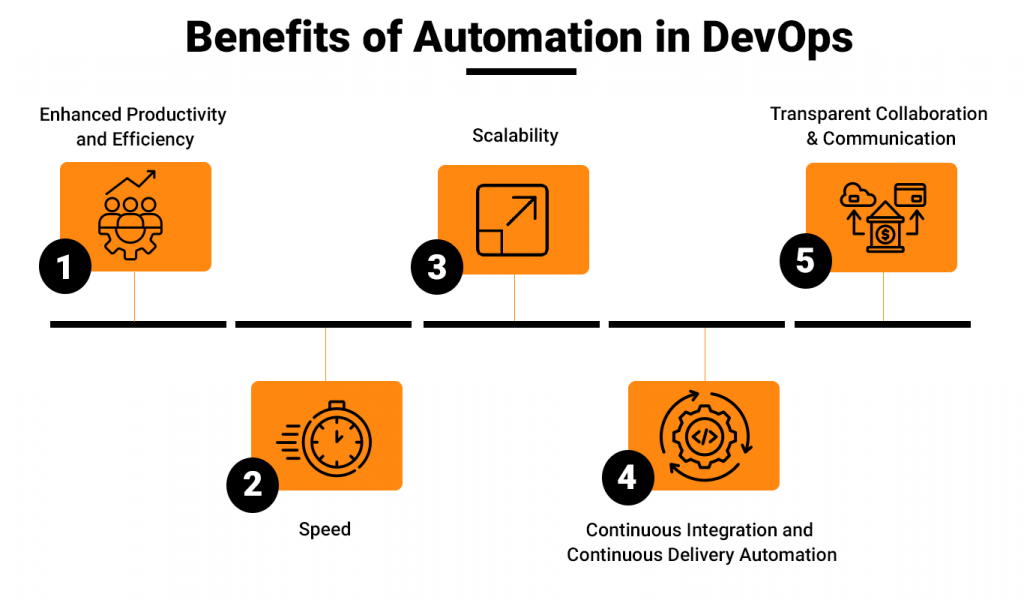The role of automation in the digital landscape is to simplify the overall software development process, including, deployment and after-release maintenance. The main aim is to expedite the delivery of innovative software solutions without disrupting the business operations.
Among various software development methodologies, DevOps has emerged as one of the prominent approaches involving the use of tools and technologies and access to IT operations teams to handle everyday repetitive chores. The automation in DevOps speeds up the development process, eliminates chances of human errors, reduces time-to-market, and results in building quality software.
According to research by Global Newswire, the global DevOps market size is projected to reach $25.5 billion by 2028. Furthermore, with over 34% of businesses looking to embrace DevSecOps practices, the adoption rate seems to be increasing. These statistical numbers highlight the growing significance of DevOps and the role of automation within operational workflows.
In this write-up, we will talk about the importance of automation in DevOps and how organizations can benefit from embracing such a methodology in their workflows.
Importance of Automation in DevOps
DevOps automation is important for several reasons, leaving a huge impact on the software development team’s efficiency. The key aspects are discussed below.
Minimizes Redundancy
Everyday repetitive tasks such as system configuration or deploying codes come with the chances of inconsistencies or create room for errors, especially when done manually. With DevOps automation, the tasks throughout the development lifecycle are automated, avoiding redundancy and reducing manual efforts.
Provide Clear Instructions
Automation for DevOps offers detailed guidelines for every phase of the software development life cycle. The expert DevOps teams can strategize workflows by employing automated solutions like scripting and Infrastructure as Code (IaC). All such clear recommendations offer a road map for developing, putting into practice, and managing infrastructure.
Moreover, it ensures clear communication and transparency in software development. Simply put, the teams can collaborate more successfully, raising the knowledge and information on the project’s progress.
Reduces Risks
Undoubtedly, automation is key to reducing risk in the DevOps pipeline. Manually handling the repetitive development procedures is prone to error, and disruptions may lead to operational hassles, increasing the product’s time-to-market.
Here, through DevOps automation, the teams can perform continuous integration, test, and deploy the pipelines to identify the problem in the early stage of the development lifecycle. Furthermore, the redundant tasks are automated, reducing the time-to-market of product release and boosting system stability.
What Are the Benefits of Automation in DevOps?
DevOps workflow automation offers a plethora of benefits, helping the team improve their efficiency and achieve the set objectives. Let’s discuss these below:

Enhanced Productivity and Efficiency
DevOps automation speeds up the development lifecycle by automating repetitive and time-consuming tasks, freeing up the team to focus on more productive operations. Automating processes such as deployment management, maximizing output, reducing human errors, and enhancing efficiency.
Speed
Another benefit of automating DevOps workflows is the speed. Integration and implementation of deploying code can be performed more promptly. The first advantage is that automation minimizes the dependency on manual operations as the automated workflow can be executed at any time of the day.
Secondly, leveraging automated DevOps tools and processes is better than to hire DevOps engineers to deal with redundant tasks. The reason is deploying a new product with the help of an engineer will take a lot of time as all the parameters are assessed manually before the release.
However, automation will perform all the chores in a limited time, saving efforts and time for the team.
Scalability
DevOps teams across various industries face challenges, especially in deployment environments and handling several apps. Here, automated systems are adept at handling all the processes with efficacy and precision. With the increasing demand, the built solutions can be easily scalable, without disrupting the existing performance.
As a result, it becomes ideal for businesses to adopt DevOps automation to ensure an enhanced software delivery cycle.
Continuous Integration and Continuous Delivery Automation
CI/CD pipeline automation saves the developer’s time and effort to execute all the steps associated with software development manually. They can automate the repetitive processes to build, test, and deploy it in an environment.
This accelerates the product release cycle, enhances code quality, and simplifies the delivery process. Also, it will enable the organizations to fulfill important business objectives on schedule.
Transparent Collaboration and Communication
DevOps-based automation facilitates better communication among the operational teams, development experts, and stakeholders. The development specialists can share project progress with the stakeholders, understand their needs clearly by communicating with them, and ensure consistent collaboration and transparency throughout the software development lifecycle.
Wrapping Up
To sum up, DevOps automation is a transformative methodology that ensures the improvement of traditional practices, ensuring the processes contribute towards exceptional end-user experiences. It makes your product more safe, reliable, and up-to-date.
Furthermore, this simplest approach not only increases the development speed and quality. It ensures adaptability, innovation, and continuous development. As a result, organizations need to embrace DevOps automation, leading to highly, agile, and responsive software product development.
So, if you are also looking to build innovative solutions to expedite software delivery, seek assistance from Orion eSolutions. We provide DevOps consulting services and have a team of DevOps specialists highly proficient in building complex solutions that ensure optimal business efficiency
Frequently Asked Questions
1. What are the best DevOps automation practices?
Answer: Top practices of implementing DevOps automation involve:
- Embracing agile project management methodologies
- Continuous monitoring
- Automate routine tasks
- Setup automated testing
- Ensure communication transparency
- Integrate security measures into the process
2. How does DevOps improve the quality of software?
Answer: Automation improves software quality in different ways such as:
- Implementing uniform testing and deployment procedures
- Enabling prompt detection and fixing of errors
- Automating compliance audits and security checks
- Facilitating quick iterations and updating delivery
3. What are some challenges that are faced in DevOps automation?
Answer: Some of the challenges faced include:
- Initial setup and incorporation of automation tools
- Maintenance and upgrading of software
- Ensuring compliance and security in all automated processes









